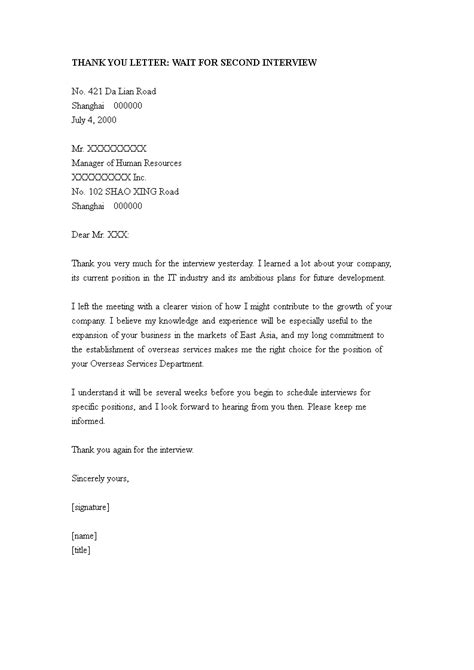Second Interview Thank You: Sample Notes And Advice

After a successful second interview, it’s important to follow up with a thank-you note. Not only does it show your appreciation for the interviewer’s time and consideration, but it also leaves a positive impression and can help set you apart from other candidates. Here are some sample notes and advice to help you craft the perfect thank-you message.
1. Send a Personalized Message
A generic thank-you note won’t make a lasting impression. Take the time to personalize your message by mentioning specific points of the interview that stood out to you. This shows that you were attentive and engaged during the interview.
Example:
Dear [Interviewer’s Name],
Thank you for taking the time to speak with me yesterday about the [Position] role at [Company Name]. I was particularly impressed by [something specific that was discussed, such as the company’s approach to innovation or the team’s collaborative culture]. This aligns perfectly with my own values and experience, and I am confident that I could make a valuable contribution to the team.
Thank you again for the opportunity to interview for this position. I look forward to the next steps in the hiring process.
Sincerely,
[Your Name]
2. Express Enthusiasm for the Position
Show your excitement and enthusiasm for the position and the company. This can help demonstrate your commitment and passion for the role, which can be a valuable asset to any employer.
Example:
Dear [Interviewer’s Name],
Thank you for the opportunity to interview for the [Position] role at [Company Name]. I am extremely excited about the prospect of joining the team and contributing to the company’s mission of [something specific that the company is known for, such as driving innovation or making a positive impact on the community].
After speaking with you and learning more about the position, I am even more confident that this is the perfect role for me. I am excited about the challenges and opportunities that come with this position and look forward to the chance to grow and develop alongside the company.
Thank you again for your time and consideration.
Best regards,
[Your Name]
3. Highlight Your Qualifications
Use the thank-you note as an opportunity to reinforce your qualifications for the position. Remind the interviewer of your relevant skills and experience and how they would be an asset to the team.
Example:
Dear [Interviewer’s Name],
Thank you for the opportunity to interview for the [Position] role at [Company Name]. As we discussed, I have [specific skills or experience that were discussed in the interview, such as experience managing teams or a track record of successful projects] that would make me a strong candidate for the position.
I am excited about the prospect of bringing my expertise to the team and contributing to the company’s success. Thank you again for your time and consideration, and I look forward to hearing from you soon.
Best regards,
[Your Name]
4. Be Professional
Remember to keep your message professional and concise. Avoid using slang or informal language, and proofread your note carefully for spelling and grammar errors.
Example:
Dear [Interviewer’s Name],
Thank you for taking the time to meet with me yesterday about the [Position] role at [Company Name]. I appreciate the opportunity to learn more about the position and the company’s goals and values.
I wanted to express my gratitude for your time and consideration and reiterate my strong interest in the position. As we discussed, I have [specific skills or experience that were discussed in the interview] that would make me a valuable asset to the team.
Thank you again for the opportunity to interview for this position. I look forward to hearing from you soon.
Best regards,
[Your Name]
5. Follow Up
If you don’t hear back from the interviewer within a week or so, it’s okay to follow up with a polite email or phone call. This shows that you are still interested in the position and can help keep you top-of-mind for the hiring manager.
Example:
Dear [Interviewer’s Name],
I hope this message finds you well. I wanted to follow up on my recent interview for the [Position] role at [Company Name]. I am still very interested in the position and would love to hear more about the status of the hiring process.
Thank you again for your time and consideration, and I look forward to hearing from you soon.
Best regards,
[Your Name]
Conclusion
A well-crafted thank-you note can help set you apart from other candidates and leave a positive impression on the hiring manager. Remember to personalize your message, express enthusiasm for the position, highlight your qualifications, keep your message professional, and follow up if necessary.
FAQs
What is the purpose of a thank-you note after a second interview?
The purpose of a thank-you note after a second interview is to show your appreciation for the interviewer’s time and consideration, express your enthusiasm for the position and the company, and reinforce your qualifications for the role.
What should I include in a thank-you note after a second interview?
You should include a personalized message that mentions specific points of the interview that stood out to you, express enthusiasm for the position and the company, highlight your qualifications for the role, keep your message professional, and follow up if necessary.
When should I send a thank-you note after a second interview?
You should send a thank-you note within 24-48 hours after the interview to ensure that the interviewer receives it while the interview is still fresh in their mind.
